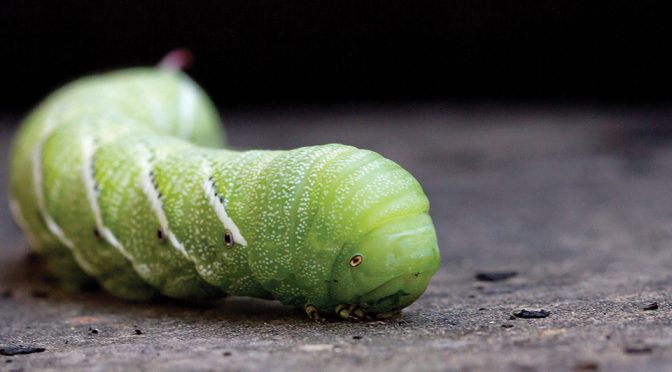Meet the tobacco hornworm. It’s a bright green caterpillar striped diagonally with white lines bordered by black dots. It grows up to be a moth, its formal name being manduca sexta.
Now meet Xiao-Qiang (Sean) Yu, professor of molecular biology and biochemistry. At his UMKC lab, Yu works with hundreds of these insects — as well as fruit flies and mosquitoes — to unlock the secrets of immunity.
“We are trying to understand how manipulation of the mosquito immune system can control/decrease transmission of infectious diseases such as malaria, Zika, dengue, West Nile and yellow fever,” Yu says. “We are also trying to understand how manipulation of the insect immune system can help control agricultural insect pests.”
Yu grew up in rural southern China and initially viewed college as a means of finding a good job away from the countryside. A passion for science came later. Early on, Yu aspired to find a cure for cancer but eventually gravitated to his current research interest. Though unrelated to cancer research, the study of insect immunity could curb the spread of human diseases, which Yu says is still one of his goals.
Humans are protected by two facets of the immune system. One arm of the immune system is our acquired (or adaptive) immunity, familiar to most of us through news reports about AIDS, polio and other diseases. Upon encountering new viruses or bacteria, our bodies “learn” to recognize and destroy them. Vaccines work on this principle. Our innate immunity, by contrast, is with us from birth, does not change during our lifetime and responds to infectious diseases in a nonspecific manner.
Insects lack the antibodies and lymphocytes necessary for acquired immunity, but they are hardly defenseless. “Insects, although much simpler than humans, possess a highly sophisticated innate immune system that can defend against various pathogens,” Yu says. “Knowledge gained from the insect innate immune system can help us better understand the more complicated human innate immune system.”
Specifically, Yu is studying how certain proteins affect the insect’s immune response. Proteins that thwart immunity could be useful in insect control. Those that boost immunity might help humans. The tobacco hornworm offers a distinct advantage because its large size — up to 4 inches — provides sufficient material for biochemical studies.
Yu’s lab has discovered a group of at least four proteins, called C-type lectins or immulectins, in the tobacco hornworm that help its blood cells fight off pathogens. He’s now learning more about how these immulectins recognize and latch on to invading microbes.
A recent finding, he says, is that fruit flies possess more than one particular signaling pathway, called Toll pathways, which relay instructional messages and likely are important in defending against pathogens. In this regard, fruit flies are more like humans than previously thought, because we have 10 similar pathways.
This discovery, Yu says, has implications for understanding both human immune systems and the evolution of innate immunity.
Another newer finding is that some proteins in the insect’s midgut may play a significant role in the resistance that insects develop to crops that are genetically engineered to kill the pests that eat them. These crops are modified with genes from the soil bacterium bacillus thuringiensis (Bt), which produces insectkilling proteins. A better understanding of resistance, Yu says, could lead to better genetically modified crops.
Yu hopes to take this research in a new direction to understand just how the midgut proteins affect Bt resistance – “particularly in mosquitoes, so we can use Bt to control mosquitoes more effectively.”
Because it takes a long time to develop a totally new product, Yu says his goal is to enhance existing ones, particularly those used for pest control.
“You can add something to make a new recipe, and then it can better deter pests,” he says.



